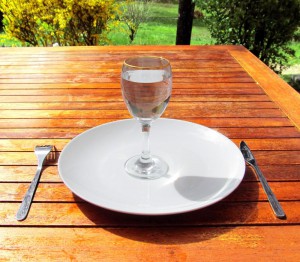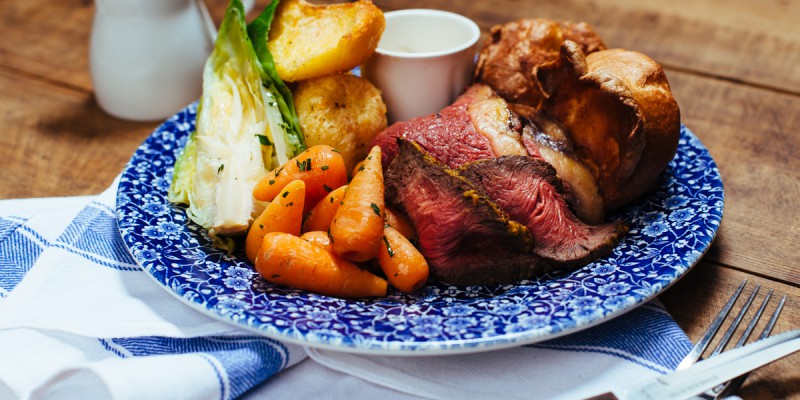You might be able to imagine the shock when I turned down my granddad’s kind offer of food. I explained to him that I was half way through my second day of fasting. He scowled the scowl of an open-minded man, but one who bares traditional values and an obvious skepticism.
Why would any reasonable man not receive this news with some manner of doubt? Not eating seems so contrary to our survival, which has always depended so highly on our ability to catch, forage, and eat food. But the truth is most of us don’t catch or forage food anymore, we simply buy and eat it. Often we eat too much of it, and often the food is not natural.
In fact, if we are to approach fasting from a natural evolutionary perspective, taking a couple of days off food can be understood to be a damn site more natural than eating three square meals a day routinely. In the days when we caught our own food we would have irregular access to it, and would often “skip meals” or go for long periods with no major food source. The idea of over-eating would be unheard of, and foods high in refined sugar or stodgy carbs would be either rare, or non-existent. There would be no reason for deliberate fasting at all.
Today, the story is quite different. We stuff our faces with pizza, pie, cakes, and all manner of horrific foods. Enter fasting; the deliberate act of giving ourselves a break.
Fasting: A Modern Paradigm
Fasting can be seen as a sort of spring cleaning mechanism for the body. The fasting state, according to the NHS, begins around eight hours after the last meal. During this time the glucose in our body is used up first, and then the body starts to look to fat reserves, releasing and using the stored energy. The benefits of burning this stored fat are obvious to anyone who is concerned with weight loss, but the benefits of fasting go far beyond that.
Fasting helps us to save energy, which would usually be used for digestion. Research suggests that up to 65% of the body’s energy is directed towards digestion after a heavy meal. The free energy saved during fasting is used by our amazing bodies to initiate a repair process, which heals damaged cells, tissues, organs, and eliminates toxins.
This healing energy immediately goes to work repairing the body, and can be felt by anyone who is fasting mindfully. Small health problems have been seen to cure themselves, and this is no miracle; it is simply the result of allowing your body the free energy to do so. Problems such as headaches, aches and pains, stomach problems, and skin conditions have been known to improve through fasting.

Moreover, science has started to demonstrate the correlation between fasting and the improvement of major health problems and diseases.
Scientific Research Showing The Benefits Of Fasting On Serious Conditions
Astounding research by Dr Mattson of the NIA’s neuroscience lab demonstrated, first in rats, and then in humans, that fasting could help to fight diseases such as Alzheimer’s and Parkinson’s. In his research rats were subject to a one-day on, one-day off eating pattern, similar to the “intermittent fasting” eating pattern. When fasting this way, they showed signs that their brain impairments slowed down, and sometimes even reversed. The research also showed that the rats maintained lean muscles over time, hinting at the possibility of longevity effects. Fasting was shown to have similar findings for human participants.
Dr Mattson believes that fasting causes the release of a certain protein, which stimulates cells and neurons in the body, speeding up cellular defense against molecular damage, and helping the body to clear out damaged cells, such as those present in Alzheimer’s patients.
Other research has also shown, across several separate studies, the positive benefits of fasting on coronary artery disease, diabetes, and coronary heart disease, by reducing the number of fat cells in the body, and the blood sugar levels too.
Recent research has shown that three days of fasting can regenerate the entire immune system, by kick starting stem cells. The stem cells in turn make new white blood cells, which can fight off an infection, effectively repairing the immune system. The researchers say that fasting is therefore particularly useful for those with damaged or weak immune systems, such as those who have had chemotherapy, and the elderly.
Research is building a brighter picture of fasting day-by-day. It is not long before the benefits of fasting can no longer go unrecognized, even in the minds of the most hardened skeptics. Until then, I recommend that you read a little more into it, and then if you are curious try it for yourself. I can vouch for it being safe, so long as it is practiced responsibly, and never as an excuse for an eating disorder.
My Experience Fasting
Modern understandings of Paleolithic theory, and an ever-evolving body of scientific research, have allowed us to transit into a new paradigm; a new perspective on fasting. Many organizations are waking up to the benefits of fasting, and are able to prove them too. This expansion of knowledge has lead many people to try fasting for themselves, and subsequently many people have felt the undeniable results; myself included.
I was first introduced to fasting during conversation with people who I met traveling. They were respectable people, intelligent, and spiritually open. Three times I was told of the benefits, and another time I was offered the opportunity to fast with others, whilst living with a Tai Chi teacher in France. I kindly rejected the offer, declaring that I would come to my own decision on the matter, and fast only if I was genuinely compelled to do so. I was a skeptic.
Months later a friend’s dad was researching Paleolithic theory, and taking up a Paleolithic diet, and the idea of fasting was to reenter my life again. He presented the best case i had ever heard for fasting, with scientific research included. He told me about the body flipping over into repair mode, focusing its energy on healing what was already there. It made sense to me, and he looked more healthy than ever after following the diet that the theory recommends.

The Time Came…
One morning the time was right; I skipped breakfast, and then lunch. I concluded that I may as well fast for the whole day, and see for myself. The first day was excruciating, but only mentally. Physically I felt very safe, and routinely checked on my muscle strength, to see if my body was weakening. It wasn’t, but my mouth would drool every time my nostrils were teased by the scent of food.
The second day I awoke far less hungry than the night before, which surprised me a little. I expected that I would want to eat straight away, but my first inclination was to go another day. I felt clear in the mind, and light in the body, although I also felt well-rooted and present. I could feel my stomach rumbling, perhaps a final sign of the digestion of the left over food in my stomach.
The day went by without any major trouble. I had met my granddad, who I mentioned at the start of this article. I had to explain to a highly rational man why on Earth I was inducing this punishment on myself. I told him that aside from the health benefits, I liked the challenge… I was telling the truth!
There is something I find very liberating about fasting, and I was starting to enjoy it. It is the will power that it requires to resist such a basic temptation as food. It was proof of my own ability to overcome my bodily cries, which urged me to eat the sugary delights before me. The joy was in my own ability to pull through; true mind over matter.
The next day I was sure I was done. It was the third day, and I woke up feeling very different. I was in an elevated state of consciousness, with an astounding level of clarity considering I had only five minutes earlier woken from a deep sleep. But I was hungry. More hungry than I have ever been, and beyond any hunger I had ever known.
I saw my friend’s dad that day. He encouraged me to make the final push, to continue the fast for another day- making for three and a half days in total. He told me that my body would be reaping the benefits of “repair mode,” conserving and healing the cells that were already there, rather than producing more. He said that this mode was incredibly beneficial for good health. I decided to carry on. Besides, I was really enjoying the challenge by this point.
I spent the day with a loved one who knows me very well. She can vouch for my mental clarity, and physical capacity at the end of the third day. Her reference is positive, and she assures me, and others who question my decision to fast, that I was not only doing fine, but that I was positively glowing, and positively connected to my true self.
The final temptation of the night came in the form of a takeaway, left unwanted in the open on the kitchen table. A chicken tikka and mince meat wrap with onions and peppers and a spicy sauce. My mouth watered helplessly. I can still smell it now. With a final glance I ran to bed, and fell asleep, hungry but satisfied.
I woke up on the forth day and decided to eat immediately. I was beginning to feel weak, and definitely had no intention of carrying on. I ended my fast shortly after. 84 hours with only water and the occasional cup of tea (with no sugar). I had barely touched a calorie in days. I felt clear. I felt spiritually connected. I felt mentally strong.
What Did I Feel Were The Benefits Of Fasting?
The first point to make is that fasting gave me a sense of my own strength of will, and an ability to overcome desire.
During, and for a long time afterwards my body felt light, and my mind felt clear. I worried less, and my thoughts were slower and more defined. Fasting seemed very compatible with meditation. During, and after fasting, I found that I was able to slip very comfortably into the meditative state.
I actually felt the useless sugars and fats in my body being disposed of; used up as reserves. This is a very cleansing feeling, like taking the garbage out, and then not producing any more. It literally felt physically relieving. My most recent fast, of only one day, left me so uplifted and physically well that I am now considering regular one day fasts, every couple of weeks.
My relationship with food also improved; I actually wanted to eat again. Not just out of habit, but out of an appreciation for food. My view of sugary snacks and drinks, and unhealthy, nutrition-lacking foods also changed. I saw them clearly as being useless energy sources; nothing more than something to “fill up on.” Some foods simply have no nutritional value, and may as well not be eaten at all.
Only after the fast did I truly have any self-awareness of my own eating patterns, because fasting gave me a reference point. It broke my eating habits dramatically, and in doing so allowed me to view them from a more objective perspective. I started to be able to decide for myself whether I was hungry, or whether I was simply being habitual or over-indulgent. My ability to turn down food when I didn’t actually want or need it also improved.
Can Fasting Be Considered Spiritual?
In the past, fasting has often been associated with religion. Indeed, many of the major religions feature varying degrees of fasting, usually for significant dates in their respective holy calenders. Take Ramadan for example, or Lent, both of which are traditional periods for a fast.
Nowadays, as we have seen in the discussion today, fasting is practiced by many different people, for many different reasons. The understanding of the health benefits have brought forth a new paradigm, and many people fast primarily for those benefits.
Fasting can, however, still be considered spiritual; it is intention, and the way it is approached that makes it so. To help you to clarify this point, consider two people taking a walk in the park. One is walking briskly with his head down, taking as many shortcuts as possible, eager to finish the walk and get inside a nice cosy house. The other walks gazing, pacing slowly and mindfully across the grass, enjoying each sensation under his foot. Even though it is raining, he is reveling in the moment, and enjoys every second of it as a chance to see the beauty even through hardship. Walking through the park can be mindless, or mindful.

If you can take a mindful approach to fasting, then the act becomes spiritual. If you are simply on a mission to lose loads of weight, and don’t care at all for developing bodily awareness in the process, then this barely qualifies as spiritual. Intention is everything. If it is your intention to make a sacrifice by not eating, to purify your body and mind, and meditate during the fast to access your spirit and soul, then it becomes a spiritual pursuit.
I personally find the spiritual approach most rewarding (in life and in fasting). I get the same health benefits, plus so much more. I see the depth in the experience, and I take lessons from it involving will power and hardship. I punish myself for my over-indulgence with periods of abstinence, which helps to balance my life. I revel in the challenge, and I jump with joy as my nervous system is rewired.
Do You Want To Fast?
If you want to fast for spiritual reasons, then this is fine. If you want to fast for health reasons alone, then this is also fine. If you don’t want to fast, then no problem. Each to their own decision, especially when it comes to your own body. If you are intrigued then there is no harm giving it a try. I carried a emergency flapjack in my pocket just in case I ever felt like passing out… I never did.
I would recommend learning as much as you can about fasting. Approach it with respect, and listen to your own body. choose a time when you feel particularly averse to food. Perhaps you feel bloated, or like you have over-indulged recently. Start when you feel like starting, and finish when you feel you should. Three days or more without food is perfectly safe, and one day is enough to feel the benefits, so it is up to you how to go about your fast.
After fasting, you will need to ease out of your state. Try not to go back to overindulging in crap food. Your body might not take kindly to this, especially if you have fasted for three days or more. Instead, eat nutrition rich fruit and vegetables. Post-fast is also a great time to make dietary changes, because your habits have already been broken down. You could cut out your usual junk food intake for example.
You will never know for yourself what benefits fasting can bring unless you try it. So when you are ready…
Summary
The negative associations that fasting suffers, and the presumption that it is damaging for health, is proving to be undeserved. The benefits of fasting are now being proven scientifically, and experiments can not only give the public faith in the health improvements that fasting can bring, but can also tell us why fasting has the physical benefits that it does. As research continues, we will be able to refine the way we fast for maximum health improvements.
The spiritual approach can bring about great transformation. When I fast I get beyond my desires, I break out of my daily habits, and I feel the sacrifice I make brings me closer to my true self (which others may define as God, or as Oneness, or as just a really nice feeling, as they please). The mental clarity that it brings about can help me to get a lot more done, in a much calmer state of mind, increasing my productivity. My emotional state also feels balanced; like my problems are somewhat humbled by the experience.
Fasting can be approached for the physical health benefits, for the mental clarity, for the challenge, or as a spiritual quest. Whichever way it is approached it can bring about enormous benefits.

